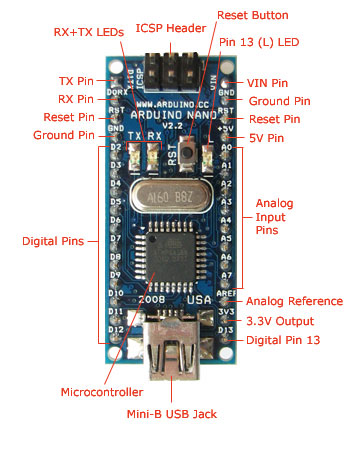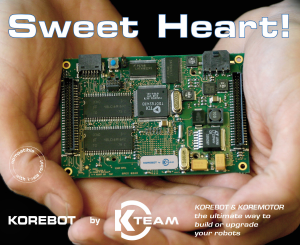Convergence
Saying yes to mobile communications and computing also means saying yes to new computing platforms. I am convinced that the future software developers will frequently work for non-PC platforms, using new tools and following an embedded systems development methodology. But not every software developer will become a mobile or embedded systems specialist which means that the university has to somehow teach the proper base knowledge without overdoing it. One way to do this is by using practical exercises in embedded control technology.
The speed how different technologies seem to converge in embedded control platforms is amazing. The sidebar shows a number of technology platforms or projects. The keywords here are:
| mobility (wireless, motor control) |
| Bluetooth modules |
| multimedia features (audio/video) for tracking |
| sensors (infrared, touch) |
| distributed systems characteristics (swarms, agents) |
| interfaces (CAN-bus, usb, whatever..) |
Open Source Hardware - Arduino
Clive Thompson describes the Arduino microcontroller that was turned into Open Source by a small Italian company (C.Tompson, Build it. Share it. Profit. Can Open Source Hardware Work? Wired Magazine, 16.11.2008).
 Everybody can use the wiring diagrams etc. to build an exact copy of the controller and it is done as a matter of fact. But strange things are happening: the Italian company is selling lots of controllers, still. They do not generate a lot of money from those controllers - and they do not plan to do so. Their business model is about services around the controller and it seems to work. So they are really interested in others copying their design.
Everybody can use the wiring diagrams etc. to build an exact copy of the controller and it is done as a matter of fact. But strange things are happening: the Italian company is selling lots of controllers, still. They do not generate a lot of money from those controllers - and they do not plan to do so. Their business model is about services around the controller and it seems to work. So they are really interested in others copying their design.
Massimo Banzi, co-founder of Arduino wrote a small booklet  Getting Started with Arduino which gives a nice introduction to the hardware platform. Especially interesting is the fact that they are using the visualization IDE processing from processing.org as their development environment.
Getting Started with Arduino which gives a nice introduction to the hardware platform. Especially interesting is the fact that they are using the visualization IDE processing from processing.org as their development environment.
Projects
In the past I have supported a number of projects which included embedded control hardware like the magic blue target (a bluetooth enabled microcontroller) or the bluetooth magic wand (a 3-D locator device). Next term some students will work with Lego Mindstorms and I am looking for easy-to-use microcontrollers which are used in learning environments. Additionally my Operating Systems lecture now includes a C language course as well.
- Free your phone - Iphone, OpenMoko etc, more..
An apple video, a thesis on OpenMoko and some thoughts on openness and smartphones with almost desktop power.
- Embedded control, mobile and wireless computing, more ...
-
Many interesting ideas from Ansgar Gerlicher in this area. Check it out if you need an idea for a thesis or lab project


